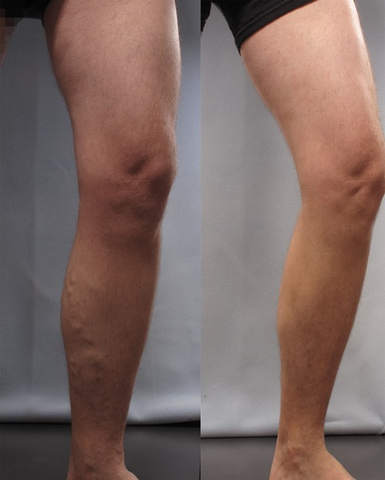Varicose veins affect more than 30 million adults in the US aged between 18 to 70, with women twice as likely as men to develop the condition. These veins bulge and rise above the skin’s surface. They are often unattractive, uncomfortable and could cause further medical problems. Now, specialists at The Stony Brook Vein Center at Stony Brook Medicine have a new non-surgical approach to rid patients of their problem veins.
Varithena, a polidocanol injectable foam, is the first and only FDA-approved foam for the treatment of incompetent veins and visible varicosities of the great saphenous vein (GSV) system. Varithena also improves the symptoms and the appearance of these troublesome veins.
“Varithena sets a new standard for the treatment of both the symptoms and the appearance of varicose veins,” says Antonios P. Gasparis, MD, Professor of Surgery, Vascular Surgery Division, Stony Brook University School of Medicine and Director of The Stony Brook Vein Center at Stony Brook Medicine. “It provides comprehensive therapy for the widest range of varicose veins — incompetent GSV, accessory saphenous veins, and visible varicosities of the GSV system both above and below the knee.”
The Stony Brook Vein Center was one of the clinical sites in the US that participated in the study that led to the FDA-approval of this new therapy. Dr. Gasparis was the principal investigator for the study at Stony Brook Medicine. Patients from the Stony Brook Vein Center who were enrolled in the study had significant improvement in both their symptoms and clinical appearance.
Treatment with Varithena is a minimally invasive, non-surgical procedure that only requires an ultrasound machine and standard medical supplies. Dr. Gasparis uses a small needle to inject the foam straight into the vein. The foam displaces blood from the vein to be treated and then causes the vein and the inner lining of the vein to close. This procedure requires no anesthesia or sedation. Varithena is even less invasive than current therapies which require thermal energy to injure the vein wall.
“Patients undergoing treatment with Varithena can return to normal activities and work following the procedure,” said Gasparis.
Post-treatment patient will be required to wear compression stockings for two weeks. Patients are encouraged to walk around the same day with minimal restrictions.
Varicose veins, 3mm or greater in width, appear twisted and cord-like, and tend to be blue to dark purple in color. They are easily visible under the skin and can present anywhere in the legs.
Varicose veins are a clinical presentation of superficial venous insufficiency—a condition in which the surface veins become enlarged and inefficient in returning blood to the heart resulting in increased venous pressure (venous hypertension).
Normally, one-way valves in your leg veins keep blood moving up toward the heart. When the valves do not work properly, blood backs up into the vein. The vein swells from the blood that collects there, which causes varicose veins.
Varicose veins are common, and they usually don’t cause problems for most people. However, in some people, they can lead to serious conditions, such as leg pain, heaviness, swelling, and skin changes. If untreated, varicose veins tend to worsen over time and can lead to bleeding, thrombophlebitis, and venous ulcers (skin breakdown).
About Stony Brook Medicine:
Stony Brook Medicine integrates and elevates all of Stony Brook University’s health-related initiatives: education, research and patient care. It includes five Health Sciences schools — Dental Medicine, Health Technology and Management, Medicine, Nursing and Social Welfare — as well as Stony Brook University Hospital and more than 50 community-based healthcare settings throughout Suffolk County. To learn more, visit www.stonybrookmedicine.edu.
The survival of local journalism depends on your support.
We are a small family-owned operation. You rely on us to stay informed, and we depend on you to make our work possible. Just a few dollars can help us continue to bring this important service to our community.
Support RiverheadLOCAL today.






























